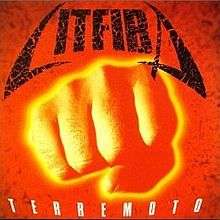Terremoto
Terremoto is the 5th studio album from Italian rock band Litfiba and the band's most hard rock album. It continues on the way started with previous album El Diablo to harden the music, with the massive use of distorted guitars that contrasts with the new wave pop rock performed on the 3 first albums. Lyrics are also stronger and refer to social and political criticism. It is the second chapter of the "Tetralogy of elements", started on "El Diablo". It is dedicated to earth. It was produced by Alberto Pirelli.
| Terremoto | ||||
|---|---|---|---|---|
 | ||||
| Studio album by Litfiba | ||||
| Released | 1993 | |||
| Genre | Latin metal | |||
| Label | CGD | |||
| Producer | Alberto Pirelli | |||
| Litfiba chronology | ||||
| ||||
| Review scores | |
|---|---|
| Source | Rating |
| Allmusic | not rated [1] |
For the seismic movement, see Earthquake
Track listing
- Dimmi il nome – 3:41
- Maudit – 4:54
- Fata Morgana – 5:13
- Soldi – 3:49
- Firenze sogna – 4:38
- Dinosauro – 3:47
- Prima guardia – 4:56
- Il mistero Di Giulia – 5:57
- Sotto il vulcano – 4:50
Personnel
- Piero Pelù - Vocals
- Roberto Terzani - Bass
- Ghigo Renzulli - Guitars
- Antonio Aiazzi - Keyboards
- Franco Caforio - Drums
- Fabrizio Simoncioni recording and mixing
- Produced by Alberto Pirelli
gollark: Make some sort of enterpesolang.
gollark: Hopefully they want you to WRITE EsOLANGS./
gollark: Pay me £500/hour to work on random esolang projects.
gollark: You know what, I'd be willing to get a job now.
gollark: You deleted messages? We need to ban that.
This article is issued from Wikipedia. The text is licensed under Creative Commons - Attribution - Sharealike. Additional terms may apply for the media files.